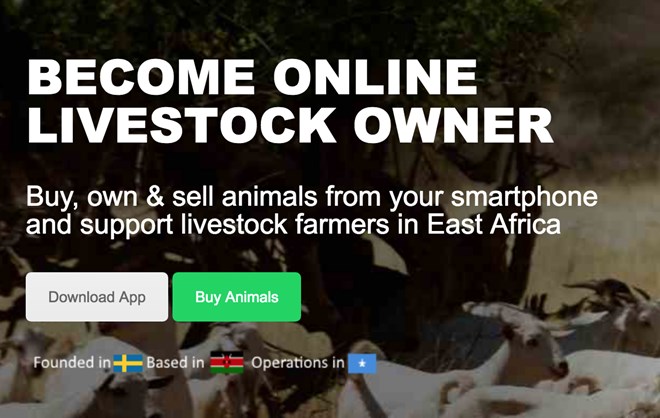The East Africa Monitor
Wednesday May 23, 2018

African innovation is becoming something of a buzzword on the international
startup scene. The continent’s unique collection of developmental challenges
and increasing entrepreneurial spirit has captured the interest of investors
around the world.
It’s also produced some wonderful solutions from African innovators who are
taking it upon themselves to do their part in solving the challenges faced by
many countries across the continent – including Ari.farm, an app that allows
people anywhere in the world to invest in Somali livestock.
Users can buy and own animals via their smartphones, which are looked after and
sold by farmers in Somalia. Their investment helps livestock farmers in the
country, creates jobs and helps them deal with the dry seasons that make
difficult to find buyers.
Somali livestock investment app
Ari.farm was founded by former UN-employee and refugee, Mohamed M Jimale, who
now resides in Sweden. During his time working at the UN, Jimale says he heard
a lot of stories about farmers and nomads struggling in his country of birth,
inspiring him to seek a sustainable solution to the increasing struggle of
farmers in Somali.
His research brought him to the concept of crowd-farming, at which point he
realised the potential of a livestock farmer’s most valuable assets: their
animals. In theory, investors don’t particularly care what they’re investing in
as long as it generates an acceptable profit and Ari.farm promises a 10-30%
return on investment, depending on the kind of animal you buy.
Even at the lower end, that’s an acceptable return and the potential for
significantly more makes for a tempting prospect.
Jimale quit his job at the UN and used the last of his wages to fund Ari.farm,
putting all of his faith and energy into the startup. Now, the platform is
starting to generate interest and gain attention from within the startup
community. It also raises the question of what else in Africa can be used as a
commodity to generate investment and help countries help themselves, rather
than rely on the tradition of donations.
Become a livestock owner online
With Ari.farm, you can buy from a range of livestock animals using your mobile,
including camels, goats and sheep. Goats and sheep both generate an estimated
10-30% return on investment while camels are expected to be in the region of
10% and 40%. – promising figures if they prove to be accurate.
Camel investors also get quarterly dividends from milk sales.
There are no additional or ongoing fees after buying your livestock and you can
sell your shares at any time of the year. After 12 months, you can choose to
withdraw or reinvest in other livestock. You also get a free replacement should
any of your animals die and you can follow local market prices via the mobile
app.
Making an impact on Somalia’s farming industry
Livestock farming contributes to roughly 40% of Somalia’s GDP but the industry
faces increasing challenges brought about by environmental factors and
insecurity in the country. Ari.farm investors get the opportunity to make money
while also making an impact on Somalia’s farming industry and help the nation
achieve its developmental targets.
Innovations like this are still a relatively new phenomenon but they’re gaining
a lot of attention. While charities and non-profits are struggling to maintain
a positive reputation and satisfy donors that enough of their money is going to
those who really need it, startups like Ari.farm offer a new kind of
alternative – on that doesn’t involve charity at all. By investing in Africa,
people are making their money work for them while knowing it’s also going to
make the same kind of impact as a charitable donation – most likely more.
Africa isn’t going to solve all of its problems with crowd investment startups
but ventures like Ari.farm are paving the way for a new kind of investment in
African countries that empowers people instead of treating them like charity
cases. Crucially, they’re also proving that innovation can come from within
Africa and the importance of understanding the how the continent’s
developmental challenges differ from other parts of the world.